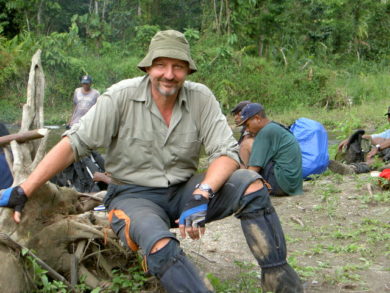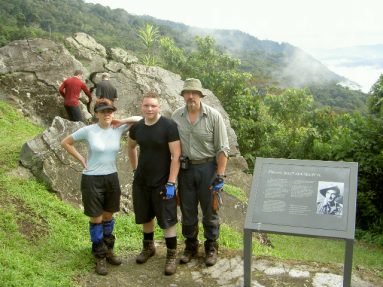Robert’s battler spirit not only helped him take on the Kokoda trail but also an ALL diagnosis
Robert, 60, of the NSW central coast has never been one to shy away from a challenge, conquering the Kokoda trail, the Himalayas, as well as a shock acute lymphoblastic leukaemia (ALL) diagnosis in 2014.

Kokoda was the first trek for Robert and his wife Kelly also taking along their son, Bruno who was just 15-years-old at the time.
“I thought it was a great opportunity for us to do something of importance together – I have a very keen interest in war and history so wanted to get a better understanding of what the Aussie militia went through to protect our country,” said Robert.
“We ended up getting a group of 16 people together for the trek and underwent nine months of training to prepare. We did a lot of research and had heard from others about how tough it is. We went to the gym six days a week religiously to get our cardiovascular fitness up and then three months prior we also joined a boot camp.”
“But really, the best training would’ve been walking up and down a ladder with a sack of potatoes on your back. A particularly unforgiving part of the trek is Seven Hills that’s up and down for 3 hours straight, a huge mental and physical battle.
“When we first got there I thought I was Arnold Schwarzenegger and insisted on carrying all my gear like what the Aussie soldiers did. Halfway through the first day I literally collapsed and couldn’t get back up so they offered me a porter for the rest of the week… I couldn’t get rid of my stuff fast enough offering my firstborn in exchange – luckily Bruno has an older sister so wasn’t offended,” laughs Robert.
Robert says that despite the relentless challenge of the trek, it’s one of the best things he has ever done.

“You hear so many stories about the displays of the heroism of our Aussie soldiers but actually being there and seeing what they had to go through – it’s both unbelievable and heartbreaking,” said Robert.
“Walking through the Owers’ Corner arch at the end is a particularly special moment and felt like a big achievement.
“I would highly recommend the trek, it was a trip of a lifetime and we certainly won’t forget it anytime soon.”
Robert’s experience on the Kokoda trail certainly draws some parallels to his experience being treated for ALL.
“It’s so important to believe in yourself, being positive and hopeful, and having positive people around you helps the journey dramatically,” said Robert.
“The ALL diagnosis was a bit of a shock as I was a very healthy person. I’d hardly been to the doctor in 26 years and the last time I’d been to hospital was when our son was born. I hadn’t had a Panadol for 15 years and suddenly I was having 47 tablets a day!
“I was given just weeks to live so started the chemotherapy immediately and I then had a stem cell transplant.
“Luckily, I reacted well to the transplant with only minor side-effects. It was the subsequent surgeries for my diverticulitis, diagnosed around the same time as the ALL, that really knocked me about but I’ve managed to bounce back and fighting fit these days.”
During the three weeks Robert spent in Sydney for his transplant, Kelly stayed in a Leukaemia Foundation patient and family accommodation unit nearby.
They are now big supporters of the Leukaemia Foundation, joining the Blood Buddies program and holding community fundraisers.
“As much as we are helping other people going through or about to go through a similar journey, it helps me understand my journey as well, and that’s given me a lot of strength and positive power. And I’ve met some lovely people along the way.”
“Doing the Kokoda Trail to Beat Blood Cancer would be a great way of improving both your mental and physical fitness all while supporting a fantastic cause that helps families like my own through their blood cancer journey.“
Last updated on August 6th, 2020
Developed by the Leukaemia Foundation in consultation with people living with a blood cancer, Leukaemia Foundation support staff, haematology nursing staff and/or Australian clinical haematologists. This content is provided for information purposes only and we urge you to always seek advice from a registered health care professional for diagnosis, treatment and answers to your medical questions, including the suitability of a particular therapy, service, product or treatment in your circumstances. The Leukaemia Foundation shall not bear any liability for any person relying on the materials contained on this website.